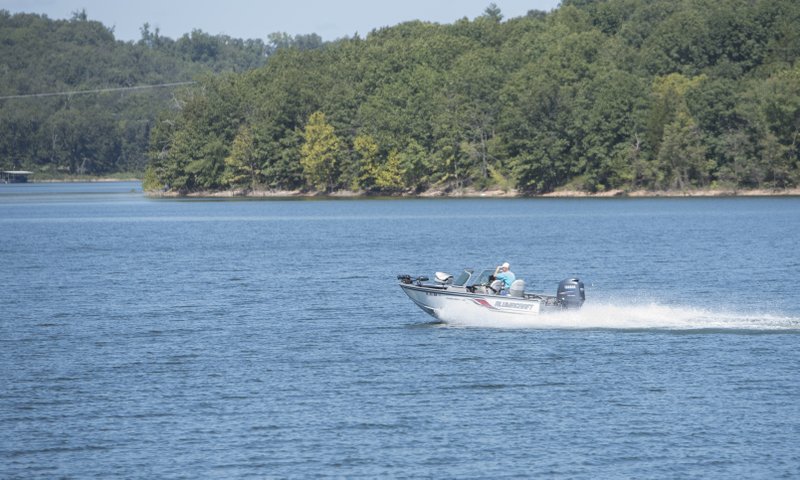As Arkansans take to the state's many waterways this Labor Day, they do so under a new state law that says driving a boat while intoxicated is as serious as driving a car while impaired.
The deaths of two University of Arkansas students prompted the state law, which went into effect this summer.
New law
A new state law requires driver’s license suspension periods for either driving or boating while intoxicated within a five-year period as follows: six months for the first offense; 24 months for a second offense; 30 months for a third offense; and revocation for 48 months for the fourth offense.
Source: Staff report
William Lewis "Trey" Varner III of Texarkana and Rachel Nicole Swetnam of Grove, Okla., were both 21 when they arrived at Grand Lake, 70 miles northeast of Tulsa, on May 14, 2013. They were killed 10 minutes after they arrived and less than 200 yards from where they got into a boat, said Sandy Varner, Trey Varner's mother.
John DeSelms of Tulsa drove the boat into a docked, unoccupied houseboat while Trey Varner and Swetnam sat in front of him. DeSelms had a blood alcohol level of 0.18 percent -- more than twice the legal limit of 0.08 percent. He pleaded guilty in August 2014 to two counts of first-degree manslaughter and was sentenced to 15 years in prison, 14 years of which he will serve on probation.
The accident led Sandy Varner to push for changes to DWI laws.
"I was shocked to learn that getting charged with driving while intoxicated in a boat didn't count on your record for driving a car [in Oklahoma]," she said. "I went home and found out it didn't count in Arkansas, either."
Varner went to her state senator, Jimmy Hickey, R-Texarkana, who agreed that the law needed to be changed.
"The guy who drives the boat is usually the one who owns it," Hickey said. "That means he's probably driving to and from the lake with the boat on his trailer. So think about that. If he's drunk on the lake, he's drunk on the 30 miles on the trip home, too."
Hickey filed Senate Bill 81, with co-sponsors including state Sens. Cecile Bledsoe, R-Rogers; Jim Hendren, R-Sulphur Springs; and Bart Hester, R-Cave Springs. The bill, which made changes to the DWI law and related measures, was supported by other victims of drunken-boating accidents.
"The whole issue had been under the radar all this time," Sandy Varner said. "There was some very emotional testimony for this bill from people who had similar stories to tell. It became a really collaborative effort.
"We couldn't change the tragedy, but we could change the law," she said.
The bill passed 34-0 in the Senate and 97-0 in the House this spring, and is now Act 299 of 2015. It became effective July 22.
Before the act became law, a boating while intoxicated or boating under the influence offense would be mentioned on an offender's driving record and could be considered by a judge in sentencing in future DWI or DUI offenses. A boating while intoxicated offense now requires suspension of a violator's driver's license and vehicle registration, the same penalty as a DWI in a car.
The law requires license-suspension periods for driving or boating while intoxicated within a five-year period as follows: six months for a first offense, 24 months for a second offense, 30 months for a third offense and 48 months for a fourth offense.
Montine McNulty, executive director of the Arkansas Hospitality Association, a lobbying group, said there was never any opposition from business owners to Hickey's bill.
"It's been coming for a pretty long time, and we were talking public safety here," McNulty said. "In the hospitality industry, we've noticed a lot less tolerance for these types of issues, and that's understandable."
The U.S. Coast Guard keeps statistics on boating fatalities, including those on inland waters. The agency has no statistics on whether laws such as Act 299 are an effective deterrent, a spokesman said, but the Coast Guard has plenty of evidence that drinking while operating a boat is dangerous.
Alcohol was the leading factor in 21 percent of all fatal boating accidents in 2014, according to Coast Guard figures. That's despite alcohol being a factor in only 12 percent of overall boating accidents, figures show.
Insurance-industry figures agree. Boat operators with a blood alcohol concentration above 0.10 percent are estimated to be more than 10 times as likely to be killed in a boating accident than boat operators with no alcohol in their systems, according to the Insurance Information Institute, a professional association of insurers.
If a person is hit by a drunk driver on land and isn't inured, he can walk away, said Seth Johnson, spokesman for the Coast Guard's regional office in New Orleans. But if a boat is wrecked on the water and sinks, the driver and passengers stand a chance of drowning. That chance goes up if a person is intoxicated, injured or knocked unconscious even briefly, Johnson said.
"I'm not going to say that driving a boat while intoxicated is any more dangerous than driving a car is. They're both highly dangerous," he said. "But when there is an accident and you're in a boat, whether it's your fault or not, you end up in the water."
As of last week, there had been 50 boating accidents in Arkansas this year, according to the Game and Fish Commission. Nine people died, with seven of them drowning.
Keshia Guyll, spokesman for the Benton County sheriff's office, said she expects awareness of the new law to have a positive effect. The sheriff's office is responsible for enforcement of the law on Beaver Lake, a popular tourist destination in Northwest Arkansas.
"A lot of people don't know the law when it comes to being out on the lake and drinking. We want people to enjoy our lakes and have a good time, but we also want people to be safe and make smart decisions," Guyll said.
The state's standard for intoxication for a driver -- boat or car -- is a blood alcohol level of 0.08 percent or higher. Someone under the legal drinking age of 21 is considered under the influence with a blood alcohol level of 0.02 percent or higher.
Penalties for those convicted start at 24 hours to one year in prison and a fine of up to $1,000 for a first offense. A second offense can bring imprisonment of seven days to one year and a fine up to $3,000. The third offense can result in imprisonment of 90 days to one year and a fine of up to $5,000. A fourth offense is a felony punishable by imprisonment up to six years and a fine of up to $5,000.
A person convicted of driving or boating while intoxicated will also be required to complete and pay for an alcohol education program approved by the Arkansas highway safety program or an alcoholism treatment program approved by the Office of Alcohol and Drug Abuse Prevention.
The law still allows someone as young as 12 to operate a boat if he has taken a boater education course and obtained a boater's license, but boaters younger than 16 must have an adult accompanying them. Under the provisions of the new law, it is possible for a youth to get violations that will count against his driving record before he is legally able to drive a car.
Stephanie Weatherington, the Game and Fish Commission's boating law administrator, said last week that the agency would "definitely have a presence out on the major lakes and rivers" on Labor Day.
"Don't drink and operate a boat," she said.
Information for this article was contributed by Scott Carroll of the Arkansas Democrat-Gazette.
State Desk on 09/07/2015


